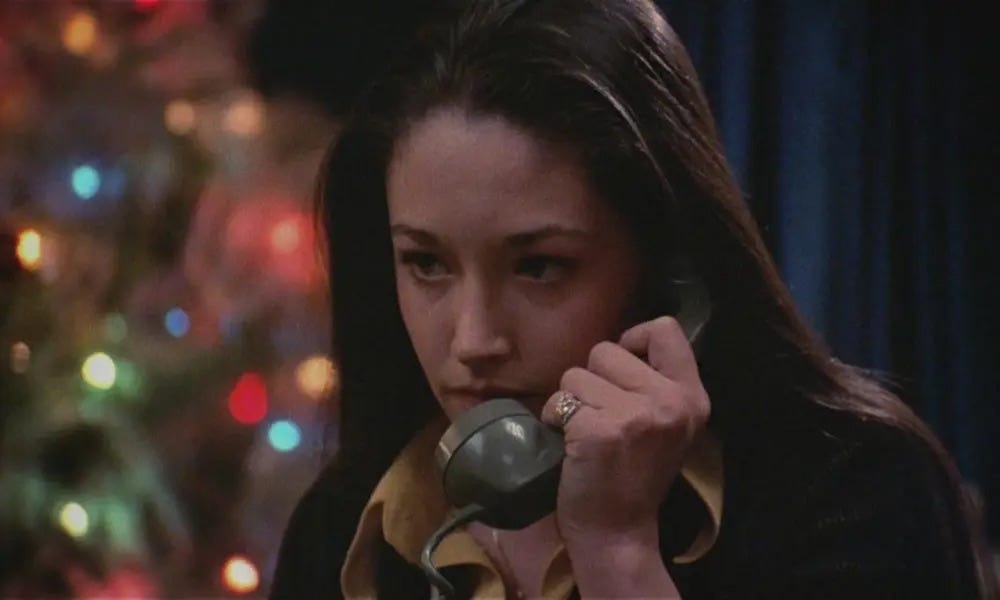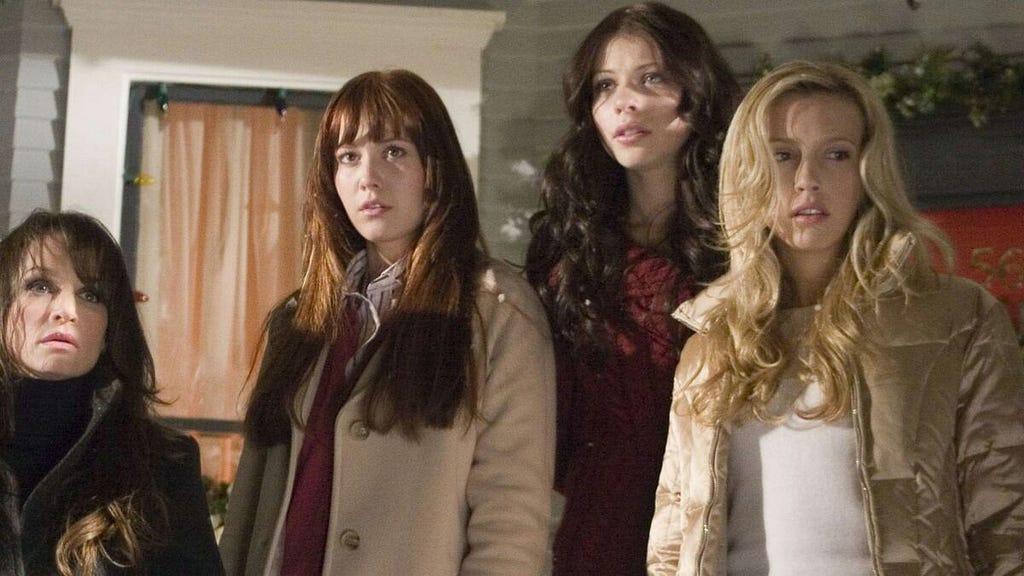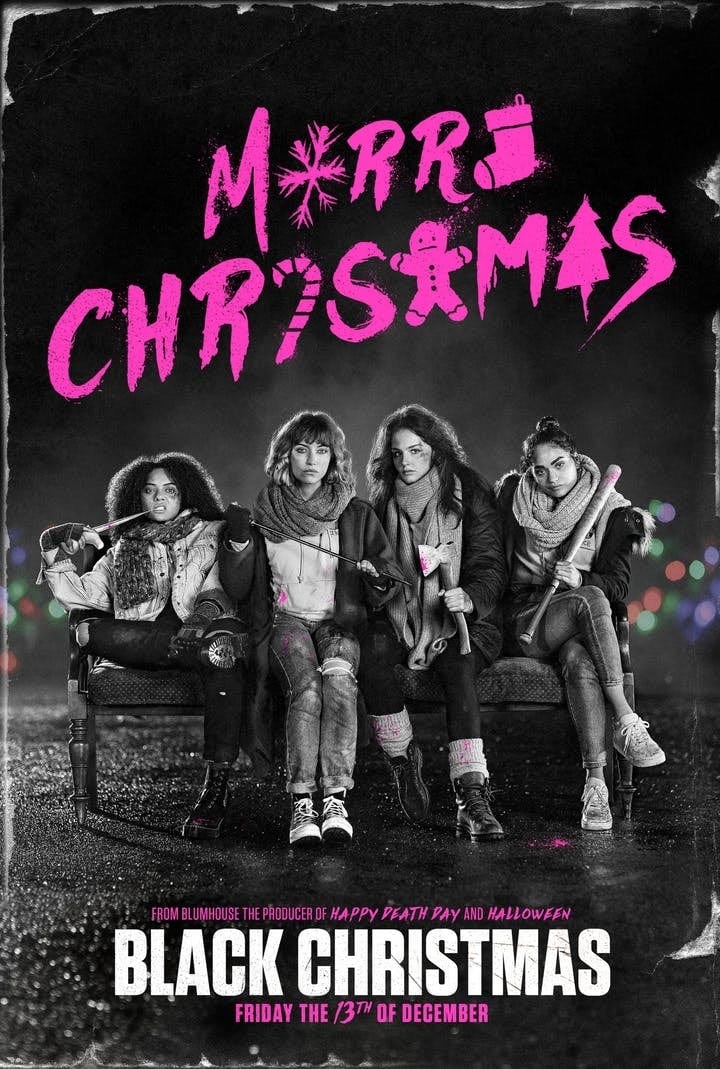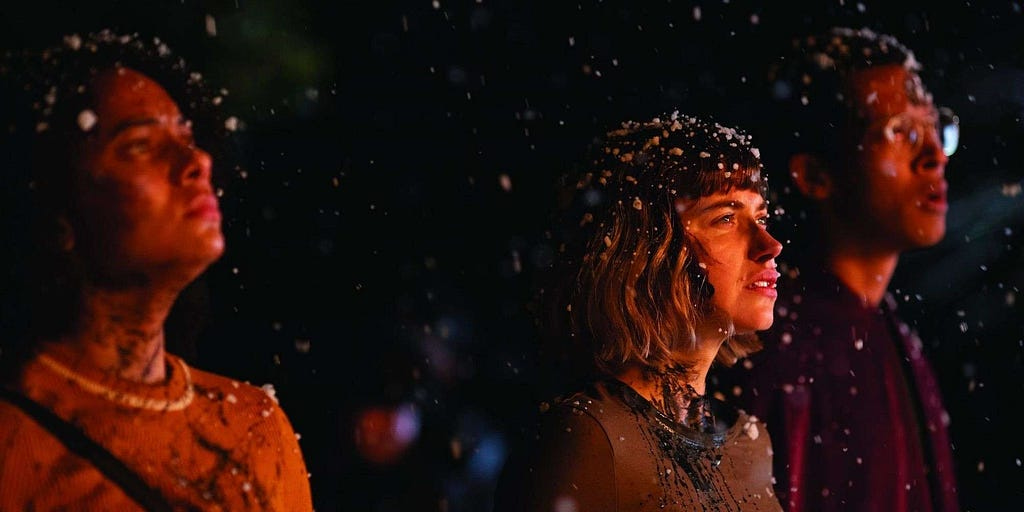Which BLACK CHRISTMAS is the best? (1974 vs. 2006 vs. 2019)
Comparing the original classic by Bob Clark, the underrated remake by Glen Morgan, and the insulting reimagining by Sophia Takal.
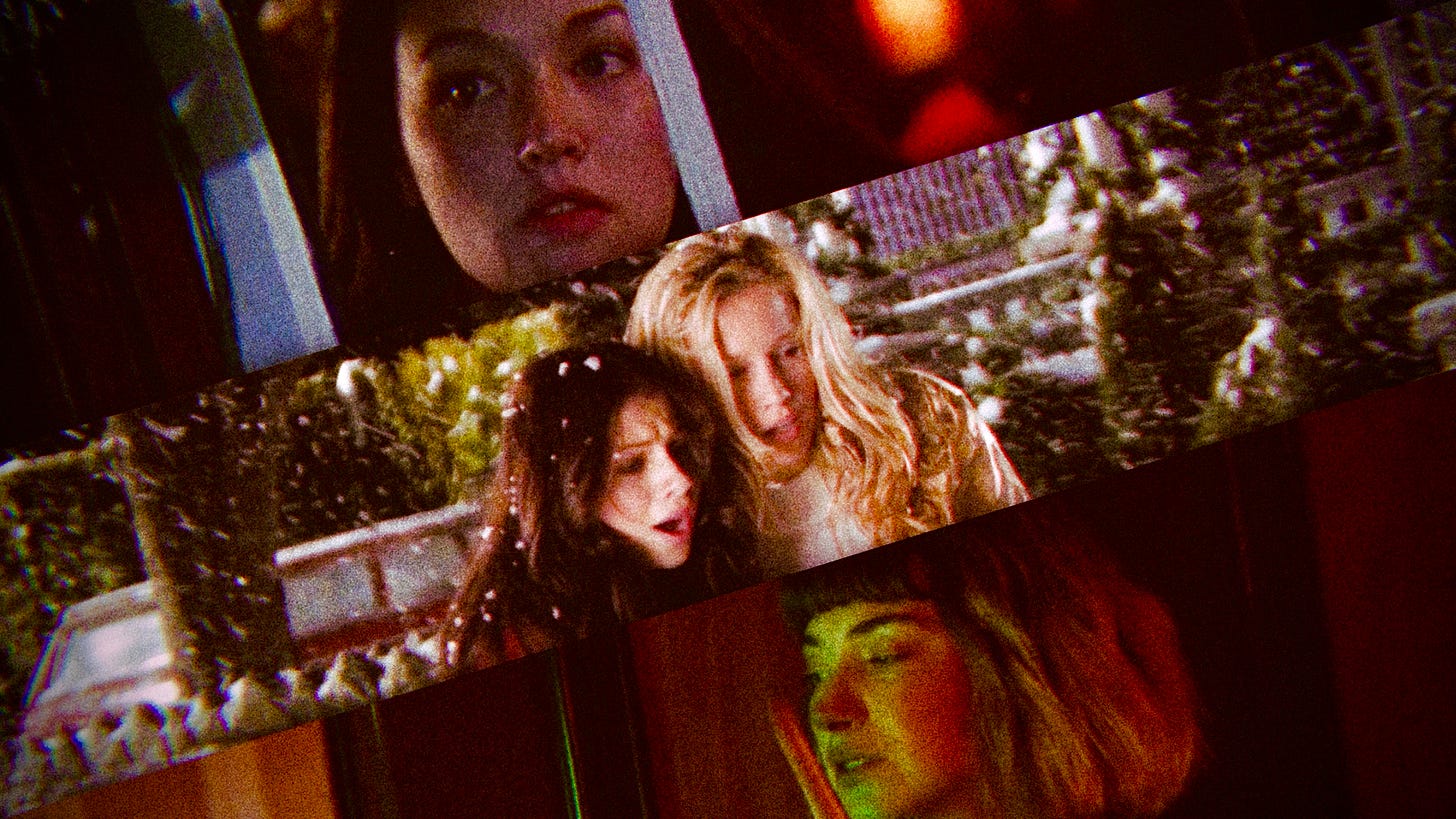
SPOILER ALERT:
First’s not the worst, second’s not fecund, third is the turd…
BLACK CHRISTMAS (1974)
(dir. Bob Clark)
★★★★★
“Little baby bunting, Daddy's gone a-hunting, gone to fetch a rabbit skin, to wrap his baby Agnes in...”
Black Christmas may now be half a century old, but time has been exceedingly kind to its enduring appeal and quality.
The subdued yet suffocating atmospheric dread of Bob Clark's masterful, tightly tonally controlled filmmaking.
The innovative cinematography by Reginald H. Morris, especially when accomplishing the sorts of unbelievable POV shots of the mouth-breathing killer’s perspective that you’d imagine only modern-day GoPros could achieve, yet shot in the early 1970’s with likely quite heavy cameras shooting on film.
The performances from all of the cast involved (including Olivia Hussey, Margot Kidder, Andrea Martin, John Saxon from A Nightmare on Elm Street, and Keir Dullea from 2001: A Space Odyssey).
The menacingly minimalist, experimental piano score by Carl Zittrer, whose darkly atonal instrumentation sounds timelessly sinister, and eternally modern.
The sparsely chilling sound design, memorably assaulting your ears with the deeply unnerving fractious breathing of the killer, and the eerie whispery voice calls harassing the women of the story, the caller’s disturbing, incoherent, and grossly perverse threats instilling a noxious dread in the pit of your stomach.
Add to this the film’s subtly explored themes of women's rights to bodily autonomy and sexual freedom, the threat of unbridled male entitlement, feminism versus conservatism, inescapable sexual harassment, misogynistic violence, and police fallibility and incompetence, all the while still being a powerful, terrifying proto-slasher/psychological suspense thriller in its own right, and it altogether makes 1974's original (and best) Black Christmas a classic of the genre that not only still holds up, but continues to maintain its icy vice-like grip of horror, and feel just as vital and furiously timely today, as it did five decades ago.
BLACK CHRISTMAS (2006)
Unrated Cut
(dir. Glen Morgan)
★★★★½
“She’s my family now.”
With horror films, how often do we not know how good we once had it until it’s way too late, and we can only appreciate something’s greater value upon reevaluation, and unflattering comparison to the lesser alternatives we have in the present?
Back in the mid-to-late 2000’s, films like Glen Morgan’s remake of Black Christmas looked like cheap, soulless, cynical, unnecessary, forgettable drivel, with no redeeming qualities to be expected of it, therefore nobody would recommend it.
Certainly I had never heard any defences of Black Christmas (2006) in the close to two full decades since it came and went from theatres onto home video. That is, until the year of our lord 2022, when suddenly I saw a video from Chris Stuckmann that declared the film doesn’t deserve the hate that it gets… and soon after that, the floodgates opened up, and I started seeing Letterboxd reviews regaling readers with reasons why the film doesn’t actually suck at all… and thus, I got curious.
On Twitter, I have often seen these random threads appear on my timeline from people talking about an assortment of movies from the 2000’s that were under-loved, and sometimes underwhelming, but nonetheless had a notable edge over many mainstream films churned out by the Hollywood machine nowadays, which was: these older movies looked good, and had a palpable care and craft visible to them that we don’t see as often in today’s post-Netflix, post-Marvel age, where most everything is digital, washed-out, flat, basic, insert-tab-A-into-slot-B filmmaking of the lowest common denominator. Whatever the case may be — whether perhaps because of the transition over to digital cinematography away from the previous abiding standard of 35mm film, or perhaps because of some amorphously definable decline in time or money or general filmmaking skill or resources in the film industry — as these threads have often pointed out, even the most milquetoast, unoriginal romantic dramas or comedies from just 15 to 20 years ago had more vibrant imagery, and interesting shot compositions, than many multi-hundred-million dollar blockbusters bother to have in the present. (The seemingly sudden upsurge in love that people have for split-diopter shots now is wild to me, but it’s certainly not unwelcome.)
All this to say that Black Christmas (2006) is an immaculately directed slice of delightfully campy, outrageously gory and gruesome horror schlock, making an almost complete 180 degree turn from Bob Clark’s original film’s tone of desolate despair and gut-churning dread rooted in gritty reality, to a hyper-stylised Grand Guignol bloodbath of gloriously trashy abandon and excess, but which is still crafted with consummate skill, love, and joy for the genre.
Equivalently, this is like the change in tone and style between Tobe Hooper’s The Texas Chainsaw Massacre and Texas Chainsaw Massacre 2, or the change in tone and style between the original The Town That Dreaded Sundown and its remake of the same name from the makers of American Horror Story (which itself is a good analogue for describing the way Black Christmas ’06 looks and feels, but without AHS’s worst qualities).
With Glen Morgan at the helm, you can absolutely tell that this film was the work of someone who worked on the Final Destination series. Outside of the obvious shared hallmarks of boasting a boisterous score from the late Shirley Walker, cinematography from Robert McLachlan, and even a cast member from that series in the form of Mary Elizabeth Winstead (a.k.a. everybody’s forever-crush), the biggest calling card of Morgan’s Final Destination bonafides bleeding over into Black Christmas is the way in which he is dedicated to an obsessive attention to detail.
Nearly every scene, and every set, is an opportunity for the omniscient camera to rove around and explore the surroundings closer than the characters ever will, Hitchcockian dramatic irony abounding relentlessly from the countless insert shots of extreme closeups of pertinent props and pieces of production design, the audience’s focus drawn to poring over every little possible source of danger in every nook and cranny, and every possible link in a chain of causality that could possibly lead to a death that results from a cascade of snowballing accidents, or intentional pileups of maliciously placed causes of grievous bodily harm.
Basically, as soon as you see the opening scene’s inclusion of an orderly’s trolley rocking an errant milk carton off onto the floor, which then jams open the door to the ward of the asylum the orderly works in, the door squeezing open the carton so the milk bursts out onto the floor… you can surely tell that this would definitely be the setup to one of Death’s elaborate “accidents” in a Final Destination movie.
And then the rest of the film is peppered with moments just like that!
It’s so much fun to witness so much effort being put into a gorefest B-movie for your entertainment, and because the filmmakers went so hard when they didn’t have to, but they did it anyway, because they love what they do.
Black Christmas ’06 is a blend of the dynamic camerawork and suspense of Hitchcock, the same plus the pulpy sordid bonkersness of De Palma, the vibrantly coloured giallo excesses of Argento, the proclivity for abundant eyeball trauma of Fulci, and the mordant blood-soaked wit of Raimi.
It’s not perfect, of course, what with all the multiple endings and multiple cuts circulating around (the R-rated theatrical cut, the unrated cut, the European cut, etc) that are indicative of its troubled production thanks to the goddamn Weinstein brothers. And if the killer’s backstory was to be gratuitously filled in so as to remove the original film’s mystery of who they were, why they were the way they were, and even what their name truly was, I do wish they would’ve kept at least Billy’s appearance more shrouded in shadow and menace, so that you couldn’t ever quite see him properly. (Then again, if I can find it within myself to forgive Rob Zombie’s Halloween II for not keeping Michael Myers’ face always enshrouded in darkness, because I saw a point to it that I was willing to get behind, then I can forgive this film, too.)
But all in all, Black Christmas ’06 was a pleasant surprise for me, back in the holiday season of 2022. So much so, that the following year, I tracked down a copy of the rarified 3-disc German Blu-ray release of the film, which — as of the time of writing — is still the only Blu-ray release of the Unrated Cut to have materialised anywhere in the world.
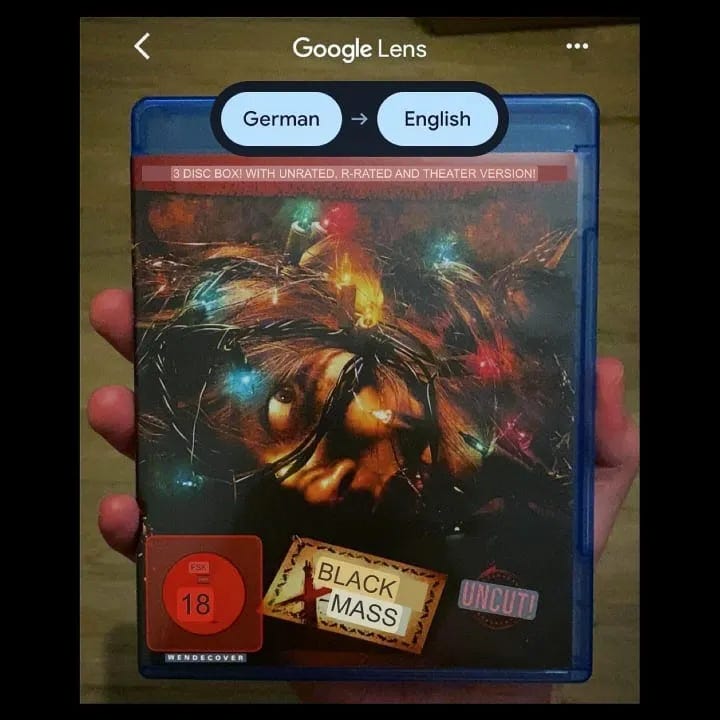
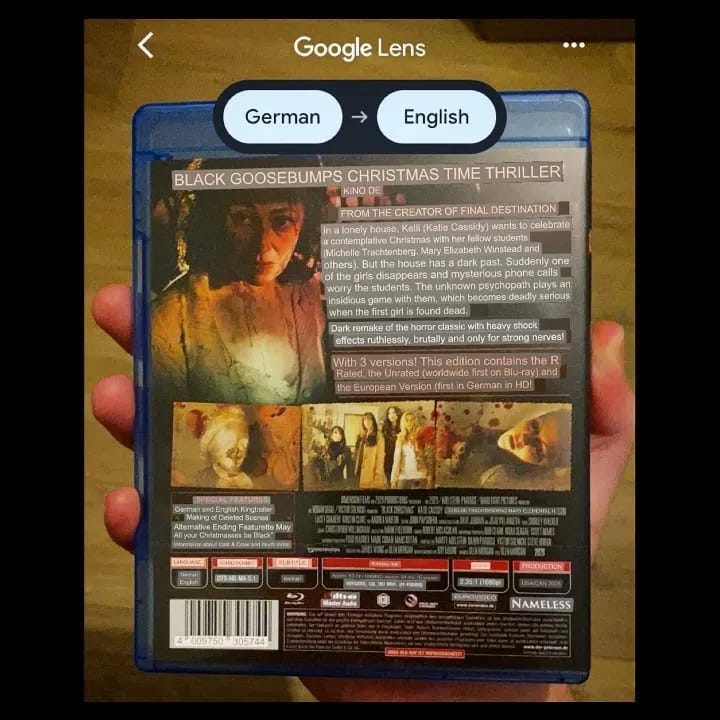
We can only hope that one of those film restoration companies/premium home video distributors of cult classics and obscure horror movies (i.e. Arrow Video, 101 Films, 88 Films, Powerhouse Indicator, Vinegar Syndrome, and the like) will eventually get the rights to reprint the film on a more widely available Blu-ray set, so that more people can see what they’ve been missing out on. Especially here in the UK, where the only theatrical and DVD release we ever got was of the butchered, truncated 80-something minute European Cut, which is objectively the worst version of the film.
All this to say:
We used to think they didn’t make them like they used to, but now we can see that in this case, they did make them like they used to, and they did such a great job of it, that we now see this as the standard to which they don’t make them anymore.
Oh, the irony.
And here I was, having wrongly thought for years that the original — and still best — Black Christmas (1974) had two bad remakes to its name, when as a matter of fact, it really only has one… and it’s demonstrably not the 2006 version… oh god no, not by a long shot…
BLACK CHRISTMAS (2019)
(dir. Sophia Takal)
★
- “You're all insane!”
- “No, no, not insane, Miss Stone. Simply men.”
There is a passage from Mark Kermode’s 2011 book, The Good, The Bad, and the Multiplex, wherein he talked of a phenomenon in media consumption that he referred to as “diminished expectations” — in essence, the act of going into something expecting it to be completely bad, only for your opinion of it to increase in positivity upon the sight of even the barest sliver of something good within it, like a dehydrated person in a vast, barren desert being grateful for a sip of water, even though they deserve so much more, and so much better, than just the bare minimum.
I bring this up because, initially, I rated the 2019 so-called remake of Black Christmas with one and a half stars, with that extra 0.5 star bump charitably included to convey the (very) few things I was able to appreciate about the film.
For instance, I liked Mark Schwartzbard’s cinematography, whose lighting and compositional style makes the film look like it could easily have been shot in the 1970’s, with lots of long lenses, wide framings, slow zooms, dramatic crash zooms, and even a split-diopter shot.
Adjacently, I liked the way that certain suspenseful scare sequences were staged and slowly built up, even though none of them made me jump, and even though one of those moments was a flagrant carbon copy of that jump-scare from the most famous scene in The Exorcist III.
I liked Will and Brooke Blair’s score. It did its job well, even if the film failed to meet the doom-laden atmospheric intent of their soundtrack.
I liked that all the white, preppy, rapey frat guy villains were styled to look virtually identical, so much so that you don’t even need to have prosopagnosia (a.k.a. face blindness) to have trouble distinguishing them from one another, because they all have the same overly styled wavy blonde haircuts, the same smug smirks, and the same genre of faces practically copy and pasted from one guy to the next.
I liked Imogen Poots, as she did her damnedest to emotionally anchor the story in some small measure of recognisable humanity, even as the film around her refused to be as good as her performance deserved. (I’ve had a celebrity crush on her ever since 28 Weeks Later came out when I was 13 or 14, so I’m always happy to see her continue to go from strength to strength in her career… well, this film notwithstanding.)
And that about covers the complete list of things I didn’t hate about Black Christmas (2019).
Everything else?
WHAT IN THE ACTUAL DIVACUP FUCK WERE THEY THINKING?
This is why I have to keep in mind the “diminished expectations” thing when I think about just how insurmountably awful this sorry excuse for a horror movie is. Because no matter how decent those few good things about it may be, the overall sum of the film’s myriad gross miscalculations, baffling story decisions, outstandingly idiotic characters, and self-parodyingly tone-deaf and jumbledly fumbled execution of the political axes it attempts to grind in ham-fisted fashion, altogether culminate in Black Christmas (2019) legitimately being Halloween Kills levels of bad.
(How weird and ironic that they both just so happen to be produced by Blumhouse, huh? Yes, quite strange…)
To me, this movie feels — nay, reeks (in every sense of the word) — of having started life as a screenplay that was completely unrelated to the Black Christmas franchise, and was instead its own original thing, hinging on its conceit as a post-#MeToo examination of rape culture, toxic masculinity, and shared sisterhood solidarity among women who fight back against the individual men who victimised them, and the patriarchal systems that enabled their crimes to carry on unpunished, all of which was wrapped up in a modern college setting, in a story that manifested and literalised the ambiguous horrors of reality into something supernaturally tangible yet metaphorical.
But then, somewhere along the way, someone (perhaps Jason Blum, perhaps someone(s) else?) had the harebrained idea that the only way to get it greenlit was under the condition that the script was retrofitted into a loose (extremely loose) remake of holiday horror classic, Black Christmas, because of that sweet, sweet IP brand recognition, baby!
So, to fulfil that remit, they just tossed in a handful of only the most cursory references to the original 1974 Bob Clark film, including:
• A white cat named Claudette.
• One shot — maybe two — where a character talks on the phone while sitting beside a bland replica of the original film’s infamous glass unicorn head, which never appears again, let alone gets used as a murder weapon. (Except, upon watching Dead Meat’s Kill Count episode for this film, I was proven wrong in my recollection, as the glass unicorn does get used as a weapon later on, but thanks to the lack of adequate coverage and coherent editing, it was so quick and unclear that I couldn’t even tell that that’s what was happening.)
• One scene of a glitchy phone call that almost sounds as though it’s going to be one of “Billy’s” multi-voiced lunatic ramblings, before it reveals itself as a fake-out where it’s just some other random character. (There is no “Billy” in this movie, by the way.)
• The general shared premise of the main ensemble cast of college sorority women getting killed off one by one at Christmas.
That’s about it.
Everything else this remake chooses to do is decidedly not what either of the two previous iterations of Black Christmas were about.
In an alternate universe, there’s a version of Black Christmas (2019) where Sophia Takal’s vision for this movie works in all the ways our universe’s version doesn’t. But alas, we do not live there. Instead, we live in the world where Takal’s film is a shallow, insulting, pretentious, patronising, clueless, offensive, trite, obnoxious, misguided, un-self-aware, contradictory, fatuous, execrable, monumentally appalling disaster, and a sorry waste of talent, time, and money.
What made the first two versions of Black Christmas so effective, and the original especially haunting, was that their monstrous killers were so terrifying because they were human, and because they could be anyone, given the right/wrong circumstances and upbringing, if you could even pin down any one definitive reason as to why they were the way they were; but no matter how much, or how little you knew about the killers, what was clear was that they were simply human beings, and that’s scary enough.
But rather than continue that thematic through-line into their contemporary reimagining, particularly when it would have made doubly more sense to do so within the context of doing a story about gendered violence in a post-#MeToo world, Takal and co-writer April Wolfe decided to go the exact opposite route, dispose of any nuanced or complex exploration of how the systemic evils of our patriarchal society affect everybody in cyclically negative ways…
…and instead just make it some sub-Scooby-Doo story where an evil magic statue bleeds an evil black goo that’s used to possess frat guys with the evil spirit of an evil dead racist misogynist who controls them into doing his evil bidding of killing sorority girls as an act of ritual sacrifice.
Also, the black goo is meant to be literal toxic masculinity.
That is seriously what they went with.
From my perspective of never having watched the trailers for this when it came out in theatres (and promptly flopped faster than you could say “I’ve lost my DivaCup!”), I was entirely unaware of this scoff-inducingly stupid supernatural angle having been plopped into the plot like a tinsel-covered turd. All I knew was the synopsis’s description of this film having a vast cultish conspiracy of killer men, instead of simply one or two killers. So when Imogen Poots suddenly delivers a massive exposition dump at the start of act three, explaining what and why everything was happening, I was blindsided. Which was not helped by the fact that the supernatural stuff comes out of fucking nowhere, with barely any setup of its existence, and Poots’s character’s explanation taking some ginormous leaps to insane conclusions, which are only not insane because, in the world of the film, it’s literally what the plot has all been about the whole time.
After that, the film’s plunge into utter irredeemable asininity went downhill faster than Elon Musk’s net worth after buying and ruining Twitter.
In the final 20 minutes or so, I actually said “FUCK YOU” aloud (twice!) in exasperation at my screen, at the gallons upon gallons of sheer stupidity the film was asking me to swallow. The very last straw that broke my proverbial back, and — to borrow a weird phrase my mother used to say — really jazzed my hump, was when that damn DivaCup appeared again.
You see, after the film’s prologue where a member of the sorority gets killed by the masked cultists, we’re introduced to Poots’s character in a scene where this other girl with glasses comes into her room, says that she’s lost her DivaCup, borrows Poots’s (presumably hopefully clean?) spare, and proceeds to shove it down her trousers and up inside herself, right in front of Poots.
And at first, that just seems like a cringey indication of the kind of tin-eared, unrealistic writing of young, modern women we’re going to get throughout the rest of the film — the kind of writing where all they talk about is sex and vibrators and boys and tampons and underwear, and they call each other “bitches” and collectively squeal in delight, and, well, you get the idea. It all sounds like these characters were written by middle-aged men attempting to mimic how they think young women talk among themselves. Like if Rob Zombie’s writing of teenage girls in his Halloween films was even worse (and I say this as someone who unexpectedly found myself liking Zombie’s Michael Myers duology). Or like if the show Girls had all of Lena Dunham’s modicum of self-deprecating insight, humanity, or writing talent sluiced out, all the well-documented annoying stuff was left behind, and what remained was mashed up in a blender with all the worst parts of similarly badly written teen garbage like 13 Reasons Why and Riverdale and Scream Queens. (I know the latter show has its fans, but when I watched its first few episodes during the time of its original airing, I did not like it very much. That’s just my opinion, same as with everything else I’ve said here.)
Wait, no! Now I remember — the prime comparison that came to mind as I was watching Black Christmas (2019) was that the dialogue sounded a lot like Noel Clarke’s hackneyed writing of his female protagonists in 4.3.2.1.
Except, this wasn’t written by out-of-touch men, middle-aged or otherwise… it was written by two millennial-aged women, who — if this film is anything to go by — seem to be equally as out of touch.
Anyway, the point is that that aforementioned DivaCup moment isn’t some throwaway unfunny comedy beat, as it first appears to be. No, it turns out it was a setup for a third act payoff that reveals the apparently “lost” DivaCup was actually stolen as part of a black magic ritual, and is highlighted among a tray of personal items stolen from all the sorority girls targeted for death by the evil frat guys, and the evil spirit that collectively possesses them all via the evil black goo. Lest we forget.
(To reiterate: This film was written by two women, directed by one of them, and none of this is treated as parody.)
Black Christmas (2019) is a fucking joke, and not the funny kind. Hell, even the presence of a song co-written by Riki Lindhome, half of Garfunkel & Oates (though here sans Kate Micucci), is not enough to tip the film over the edge into either overt satire, or unintentionally so-bad-it’s-good hilarity.
Speaking of that song, that brings me to the film’s questionable moral messages communicated by the script, via the actions of the characters, and the turns of the plot.
See, that aforementioned Garfunkel & Oates-esque original song, ‘Up In The Frat House’, is part of a pivotal plot point wherein the four main girls perform the song to an audience in the evil fraternity’s palatial mansion/frat house, in what’s posited as a big middle finger to the frat boys’ sexist behaviour, and specifically a middle finger to the guy who we learn had raped Riley (Poots’s character).
What’s disturbing and ethically dubious about this scene is that:
1) Riley is forced to participate in this song-and-dance number by her pushy, overbearing “friend” Kris (played by Aleyse Shannon).
2) Riley is clearly shown to still be dealing with the understandable PTSD that came from both the assault — which Kris, and everyone else, knows about — and the fact that the police, and the authorities at the college, didn’t believe her.
3) Kris forces the obviously reluctant Riley into performing this song - a song that tacitly calls out the crime her rapist committed - in front of her rapist, AND his friends, and lamely argues that it would somehow be empowering for Riley, and give her her voice back, even though the reality of the situation is that Riley’s being asked to do this just to replace the girl who was supposed to be performing, but got sick before the show, so Kris is using Riley to fill that inconvenient gap. (Although we later find out that that girl who fell ill is actually an evil Aunt Lydia type working traitorously for the frat cult, and was the one who stole the goddamn DivaCup and other assorted possessions for the black magic ritual, so I guess this is all meant to be part of her and the cult’s plan to ensnare Riley? It’s unclear, and really, who gives a shit?)
And 4) Kris is an obstinate, selfish twerp who sees herself as being the ultimate progressive woke ally liberal boss bitch, yet her actions here, and throughout the film, show her to be hypocritical, disingenuous, opportunistic, and in her desire to push Riley into performing in front of the man who victimised her, Kris is a fundamentally fake feminist who doesn’t really have other women’s best interests at heart like she proclaims.
Oh, and the song-and-dance number in question?
It’s the four girls performing in sexualised Santa outfits, basically recreating that one scene from Mean Girls, only now in the context that these girls are doing some vaguely sexy choreographed routine based around a song with lyrics calling out college date rape, directed specifically at the guy who raped one of the girls forced to perform the song onstage for him to see, and for him to react to in what will surely be a negative way.
WHICH ANY REAL HUMAN WOULD FIGURE OUT EASILY, AND ANY REAL HUMAN WOULD WANT TO AVOID.
But these characters are not real humans.
No fictional characters ever are, of course, but what I mean is that almost nobody in Black Christmas (2019) is written with recognisable human behaviours that one can relate to.
The closest we get is with Riley, our protagonist, but even that is mostly down to Poots’s grounded, believable performance.
Everybody else’s behaviours and decisions are dictated by what the plot wants them to do, regardless of whether or not it makes logical or emotional sense.
Take the ‘Up In The Frat House’ performance.
Once you apply the slightest scrutiny to it, in terms of seeing it the way you would in reality, its reasons for existence fall apart at the seams.
No one would ever think it was a good idea to perform an anti-rape song directly within the lion’s den of a house full of suspected and/or confirmed rapists.
No one would ever think it was a good idea to perform said song in Santa-themed mini-dresses, and perform it in the style of some cheeky, sexy, cabaret-ish number, especially not in front of an audience you want to have take your anti-rape song seriously, and especially not if you want a particular rapist, whom you know is watching, to see it.
No one would ever think doing some passive-aggressive, cutesy-yet-spiky protest song would do any good at either deterring would-be rapists, or scaring already-rapists into being afraid that their crimes will be outed, and they’ll be punished. And definitely not when they’re in the same room, and the threat of retribution is so much more likely, instant, and terrifying should they attack in response, which you would never want to provoke, just for your own safety.
NONE. OF. THIS. FEELS. LIKE. THINGS. REAL. PEOPLE. WOULD. DO.
To add insult to injury? Inevitably, a video of the performance is uploaded online for all to see, frightening Riley with the prospect that her attacker will retaliate because of the video’s viral spread beyond the confines of the college. And in the second act, there’s a scene that seems to start critiquing Kris and her character, after it’s revealed that she was the one who released the video, without care or regard for Riley’s well-being, with Kris only being concerned with making a statement above all other concerns. It makes sense, then, that Riley would berate Kris for her selfish recklessness, particularly when at that point in the plot, there’s every chance that video precipitated the mysterious, sinister texts the girls have been receiving. Kris gets justly called out, and for a moment, the film threatens to become an interesting exploration of when the well of activism is poisoned by bad actors abusing good causes for their own gains. But alas, in another of its myriad maddening failures, it turns out that the film thinks Kris was in the right! Because in the big sorority-vs-fraternity climax, it has Riley apologise to Kris, instead of the other way around, having Riley say that Kris was right, and she should’ve listened to Kris all along!
WHAT?!!!???!
Black Christmas (2019) feels like it was written as a right-wing parody of what conservatives think left-wing people are like. If you didn’t know it was written by Takal and Wolfe as an apparently earnest attempt at melding feminist politics with slasher horror, you’d think that this was a Daily Wire production with the likes of Ben Shapiro and Kevin Sorbo as executive producers, there to ensure this resembled their idea of a damning critique of the woke feminist liberal agenda, turning all the characters into idiotic caricatures, and making a plot so absurd that it makes the snowflake leftists look like lunatics. In that respect, it’s hugely similar to the feeling of Mindy Kaling’s universally loathed adult animated series, Velma (which actually is a Scooby-Doo reimagination, ironically).
Everything about Black Christmas (2019) — its broken politics, its grating dialogue (“suck a fat fart, because you just got zeta’d!”), its shoddy editing, its PG-13 anti-gore, its disrespectful disregard for the original film, its catastrophically stupid plot, its condescending self-importance, its appalling lack of understanding its own ideological fallacies and hypocrisies, its cop-out cheats in avoiding complexity in its themes in favour of broad tokenism and overly simplistic attitudes, and its profound void of any thrills, let alone scares — altogether makes it one of the worst failures of imagination, and one of the worst mainstream films of any kind, in recent memory.
Bah fucking humbug to this movie.
Put it in the Burn Book where it belongs.






